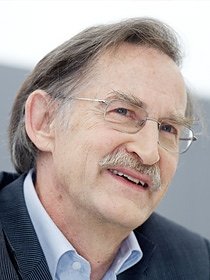Manfred Reetz receives the Blaise Pascal Medal for Chemistry and becomes member of the European Academy of Sciences
The aim of the non-profit, independent non-governmental organisation EURASC is to attract the best European researchers as members in order to strengthen European science and transnational cooperation.

Emeritus Director Manfred T. Reetz has received a new award for his research work: he was honored with the Blaise Pascal Medal 2020 for Chemistry and is an elected member of the European Academy of Sciences (EURASC). The prize, first awarded in 2003, is given to researchers for their outstanding and proven personal contributions to science and technology and for promoting excellence in research and education. The award will be presented in October at the Symposium on Micro and Nanotechnologies for Medicine and Life Sciences in Paris. EURASC is a non-profit, non-governmental and independent organization of distinguished scholars. It aims to elect the best European scientists as members in order to strengthen European science and scientific cooperation across national borders.
About Manfred T. Reetz
Manfred Reetz joined the Max-Planck-Institut für Kohlenforschung in 1991 as Scientific Member and Director, where he conducted research in the field of synthetic organic chemistry/biocatalysis. During the first 6 years as the sole Director, he restructured the MPI with the establishment of five independent Departments, all dedicated to catalysis. Reetz became an emeritus in 2011 and was then appointed Hans Meerwein Research Professor at the University of Marburg. During this time he remained associated with the MPI as external group leader. In 2019 he returned to the MPI in Mülheim, while simultaneously being professor at the Tianjin Institute of Industrial Biotechnology, Chinese Academy of Sciences, where the projects initiated in Marburg are being finished.
Reetz made a significant contribution to the development of stereoselective catalysts, which are now used worldwide on an industrial scale for the synthesis of complex organic molecules, specifically on the basis of "evolution in the test-tube". This novel concept was developed by the Reetz group in the MPI more than two decades ago and serves to optimize the stereo- and regioselectivity as well as activity of enzymes from nature - following the model of natural evolution. To do this, the process of "directed evolution" is exploited in that - unlike in nature, where mutations only occur by chance - a sufficiently large number of mutations are induced and then the most selective mutants are identified by high-throughput screening. In recent years, Reetz and his team have developed new molecular mutation techniques and statistical search methods including machine learning with the goal of making directed evolution faster and more reliable (review: doi 10.1002/anie.201901491). The generation of stereoselective enzymes by directed evolution is complementary to the development of chiral transition metal catalysts and organocatalysts, as practiced in other Departments of the MPI.
Manfred T. Reetz has been awarded numerous renowned prizes for his work, including the Leibniz Prize of the DFG, the Otto Hahn Prize, the Prelog Medal and the Japanese IKCOC Prize. He is a member of the German National Academy of Sciences Leopoldina and the North Rhine-Westphalian Academy of Sciences and Humanities and honorary professor at the Shanghai Institute of Organic Chemistry, China.











